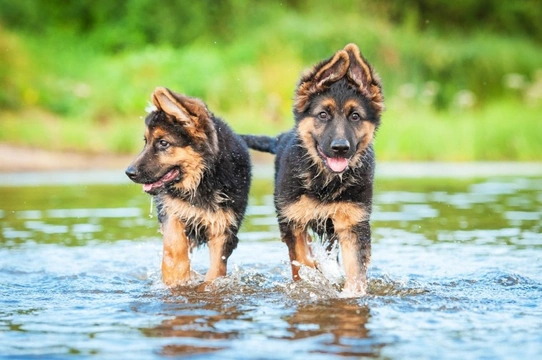
Can German shepherds swim?
The German shepherd is a large and very handsome dog breed that many of us associate with police and guarding work, but the breed’s original working role was actually as a combination livestock herding and guarding dog, and the clue is in the name!
Whilst most of us never have and never will see a German shepherd being used to herd livestock today, the breed is versatile, intelligent and energetic enough to make it a brilliant fit for all sorts of modern working roles too, and also, to ensure they made the transition to life as pets and companions with ease as well.
As a large, smart, high energy and very confident dog breed, the German shepherd is certainly not a good fit for everyone, but for the right owners who do their research and know how to care for a dog of this type, they can be very rewarding companions.
One question that people researching the breed inevitably get around to considering is whether or not German shepherds can swim; after all, this is not a breed that most of us immediately bring to mind with a mental visual of them in water.
So, can German shepherds swim, is this good for them, and do they need to be taught to swim? Read on for the answers to all of these questions and more.
Can German shepherds swim?
Can German shepherds swim? Yes. Mostly. But sometimes no… Let’s break that down a little.
First of all, all dogs can swim insofar as they will make the relevant swimming movements instinctively if placed out of their depth in water. Not all dogs can stay afloat though, generally being those with short legs and flat faces; neither of which are traits possessed by the German shepherd.
However, these are not the only conformation traits that can curtail or hamper a dog’s swimming ability, and there is another physical trait that can be seen in some dogs of the German shepherd breed that makes swimming and staying afloat difficult if not impossible for them.
Modern German shepherds today have a far more acute angle to the slope of their backs and hips than they did historically, even compared to dogs from as recently as 30-40 years ago.
The degree of the slope within individual breed lines can vary considerably; and dogs with a very acute slope are prone to hip dysplasia and mobility problems, which their more balanced, healthy-build cousins are far less likely to suffer from.
This also means that dogs whose backs slope away sharply towards the hips will have problems swimming, as they will find it hard to stay balanced in the water and achieve propulsion.
A German shepherd with a balanced conformation not prone to exaggeration of the slope of the back and notwithstanding any other conformation or health issues will be able to swim; those with exaggerated conformations may not.
Is it safe to let a German shepherd swim?
As long as your German shepherd has an appropriate build to be physically able to swim and of course as long as you ensure that the water is warm enough, they can get in and out safely, and they don’t get overly tired, swimming itself is safe.
However, access to get out, the water itself, and the wider environment where you might take a German shepherd swimming can themselves pose risks, which are factors you need to consider and investigate carefully before you let your dog get in the water.
Can German shepherds with hip dysplasia swim?
As mentioned earlier on, German shepherds with an acutely sloped back and angle between their back and hind limbs are at higher risk for hip dysplasia, which is a widely recognised and widely distributed problem within the breed.
This will curtail some dog’s swimming ability, or make it unsafe. However, for many dogs with hip dysplasia, swimming is an excellent form of low-impact exercise that actually comes with many more benefits for them that walking.
Even German shepherds that cannot swim safely outdoors like other dogs may benefit from hydrotherapy for hip dysplasia as part of their wider veterinary treatment and management regime.
Do you need to teach German shepherds to swim?
All dogs will swim instinctively when in water, and so the physical action of swimming isn’t something German shepherds need to learn. However, all dogs should also be appropriately introduced to swimming in a place that is safe and comfortable, with plenty of encouragement and reassurance from their owners, to ensure that they enjoy it and don’t find it frightening.
Do German shepherds like swimming?
All dogs are individuals, and so this can be quite variable. The German shepherd is not one of the breeds most closely associated with an affinity for water, but they are active, confident dogs that enjoy all manner of forms of stimulation and so many German shepherds will be very keen swimmers.
Others may be more reluctant, or even actively dislike it; but safe, enjoyable early introductions to the water can help to avoid your German shepherd disliking swimming.



